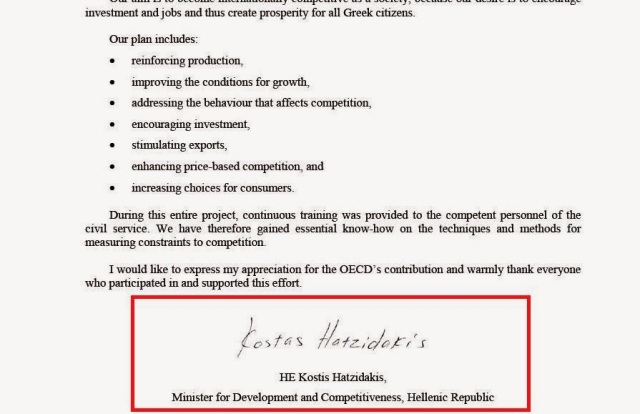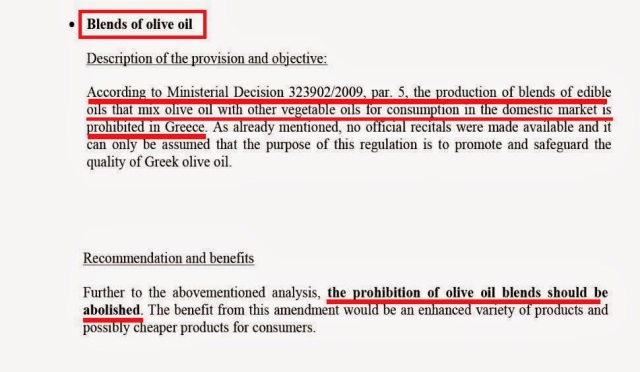
Διαβάστε τι προβλέπει η μελέτη ανταγωνιστικότητας του ΟΟΣΑ για την Ελλάδα (OECD Competition Assessment Reviews Greece, 2013)…για το λάδι..
Την μελέτη που έχει υπογράψει ο Χατζηδάκης
και είναι προϊόν συγχρηματοδότησης, με την συνδρομή της Ελλάδας…

Μας ζητάνε να καταργηθεί η Υπουργική απόφαση 323902/2009 που απαγορεύει την νόθευση ελαιόλαδου με άλλα λάδια…
και να επιτραπεί στην ουσία η νόθευση-πρόσμιξη του αγνού μας παρθένου ελαιόλαδου..
για να γίνουμε ντε και καλά ανταγωνιστικοί…

Blends of olive oil
Description of the provision and objective:
According to Ministerial Decision 323902/2009, par. 5, the production of blends of edible
oils that mix olive oil with other vegetable oils for consumption in the domestic market is
prohibited in Greece.
As already mentioned, no official recitals were made available and it
can only be assumed that the purpose of this regulation is to promote and safeguard the
quality of Greek olive oil.
Harm to competition:
European legislation does not prohibit the circulation of blends of olive oils with other
vegetable oils. According to article 6, par. 1c of the European Regulation 29/2012: “Member
States may prohibit the production in their territory of blends of olive oil and other vegetable
oils referred to in the first subparagraph for internal consumption.
However, they may not
prohibit the marketing in their territory of such blends coming from other countries and they
may not prohibit the production in their territory of such blends for marketing in another
Member State or for exportation”.
However, other Mediterranean countries (such as Spain) with a long-established olive oil
tradition do not apply a similar restriction and hence are more competitive on the
international market. It is our view, therefore, that this provision prevents Greek producers
from competing in the domestic market against cheaper imported blended oils (for frying, for
instance).
In addition, such a restriction tends to limit the variety of products supplied, especially the
lower-priced ones. By increasing quality standards disproportionately for only a range of
suppliers, the provision limits consumer choice. Regulations that force the quality of daily
consumables to unnecessarily high levels may disadvantage low-income consumers who
may be willing to purchase a quality below the one allowed.45 Quality issues can be covered
by the obligation for clear labelling in order to distinguish olive oil from blends or to indicate
the presence of olive oil (and so enhance the reputation of the Greek product). EU
legislation which was established exactly for this purpose, i.e. the guarantee of authenticity
of olive oil, focuses on the clear labelling of the product rather than a horizontal prohibition
of blends of olive oil, having taken into account the issue of the blending practices with
respect to the quality of the product.
Greece has the highest per capita consumption of olive oil in the EU (2011/12 data), with
17.9 kilos, followed by Spain with 12.6 kilos, Italy 10.9 kilos, Cyprus 7.5 kilos and Portugal
7.4 kilos.46 However, total olive oil consumption decreased from 227 500 tonnes in 2010/11
to 208 000 tonnes in 2012/13.47
This decrease may be a result of the economic crisis and the
gap between olive oil which is of a high quality and usually expensive48 and a cheaper
product. This means that a blend of a high percentage of olive oil and oil that is cheaper than
virgin olive oil, would be most likely consumed by Greek consumers, enhancing both the
variety of products available and consumer choice.
However, as a major player in the olive oil sector Greece could take advantage of European
Regulation 29/2012, article 6, par. 1a, which explicitly provides a method for placing a blend
of olive oil on the market
Recommendation and benefits
Further to the abovementioned analysis, the prohibition of olive oil blends should be
abolished. The benefit from this amendment would be an enhanced variety of products and
possibly cheaper products for consumers.
ΠΗΓΗ
ΠΗΓΗ erevnw

Δεν υπάρχουν σχόλια:
Δημοσίευση σχολίου